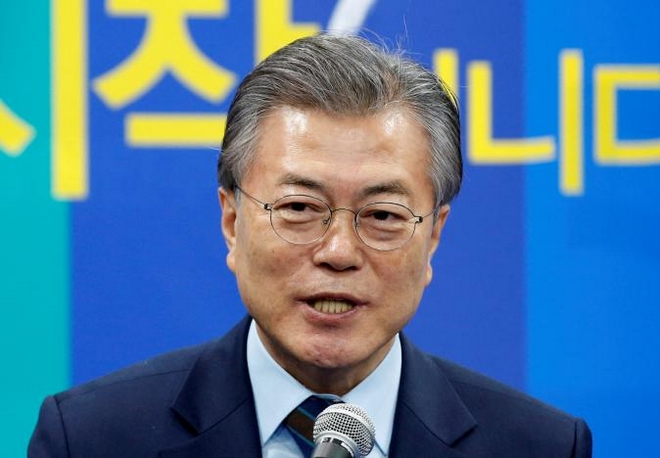
The Democratic Party's candidate for the presidential primary Moon Jae-in makes a speech at an event to declare their fair contest in the party's presidential primary in
South Korea's main opposition Democratic Party of Korea may well win the upcoming presidential election and suspend the controversial deployment of the Terminal High Altitude Area Defense (THAAD) anti-missile system, said a Chinese expert.
"It is very likely that the Democratic Party of Korea would win the presidential election which is to be held by May 9 at the latest, and the country's largest opposition party would call a halt to the deployment of the THAAD system," Li Chunfu, vice director of the Asia Research Center of Nankai University, told the Sino-US.com in a recent interview.
Li said that the judgment is based on the political tradition that the conservative and progressive parties have been in power in turns for 10 years since the country's democratization in the 1980s, and thus the progressive parties such as the Democratic Party of Korea "would be at the helm of the state for the next decade".
The remarks came as Choo Mi-ae, chairwoman of the Democratic Party of Korea, claimed to file a lawsuit against South Korea's defense ministry which steered clear of the country's National Assembly to deploy the THAAD system. Choo also called for immediate suspension of impeached President Park Geun-hye's security and diplomatic policies.
"The decision by the Park Geun-hye government to introduce the THAAD system to South Korea lacks legitimacy because it is just an administrative order which is not approved by the country's National Assembly and cannot represent the will of the state," Li said, adding that the THAAD deployment would meet strong resistance and would not be completed before the presidential election as planned.
He said that the proposal of deploying the THAAD system should have been discussed at the National Assembly which balances the interests of various political parties and that the final decision must take into full consideration the voices from all walks of life.
So far, the presidential candidates of the Democratic Party of Korea have unanimously voiced objection to the deployment of the THAAD system, calling for a thorough reflection of the security policy under Park's presidency. Other South Korean opposition parties including the People's Party and the Justice Party hold similar views.
At a recent press conference, Moon Jae-in, a presidential candidate from the Democratic Party of Korea, said that question of the THAAD deployment should be left for the next government, adding that he has full understanding of the concerns and objection from China, which sees the THAAD deployment as a severe threat to its security interest and regional stability.
Moon, former head of the Democratic Party of Korea, is leading the race to South Korean presidency with 29.9 percent, according to a survey conducted by the Korea Research Center for the Yonhap News Agency and KBS broadcaster on March 11 and 12. Ahn Hee-jung, Moon's fellow party member and a provincial governor, came second with 17 percent.
Trade war with China?
Since the announcement of a land swap agreement between Lotte Group and South Korea's defense ministry to facilitate the deployment of the THAAD system last month, many Chinese travel companies have stopped offering tourism products associated with South Korea and several big cruise lines have cancelled calls to South Korean ports by cruise ships sailing from Chinese cities. Last week, 3,400 Chinese passengers refused to go ashore when their cruise ship docked at the island of Jeju, marking the first time that such a large group of passengers refused to disembark at the South Korean resort island in over two decades.
However, Li said that China should distinguish the targets that should be punished over the deployment of the THAAD system in order to avoid a trade war with South Korea.
"We must be firmly against the groups and enterprises that support the deployment of the THAAD system, but we should prevent the boycotts from spilling over to unrelated sectors given that the irrational boycotts could be used by forces in favor of the THAAD deployment," Li noted.
As early as August 2016, Moon said on his personal Twitter account that the top priority for South Korea's diplomacy is to prevent the relations between South Korea and China from being soured by the deployment of the THAAD system.
'Acceptable option'
Although the placement of the THAAD system in South Korea is strategically significant for the US push to monitor the military movements in North Korea and northern China, a suspension of the deployment would be an "acceptable option" for the US, Li said.
"The proposal of accelerating the deployment of the THAAD system was first raised by the current South Korean government rather than the US government. If the next South Korean government stops the deployment due to adverse public opinion, I think that the US would accept it. Still less, installing the THAAD system is just a verbal agreement between South Korea and the US," Li said.
In a recent interview with the New York Times, Moon said that South Korea should learn to say "no" to the US, raising uncertainties over the deployment of the THAAD system if he is elected as the president.
"The deployment of the THAAD system will intensify unnecessary tensions in the Korean peninsula and will even cause permanent hostility with North Korea," Moon said, questioning that the tough policies adopted by South Korea's conservative regimes and the US over the past decade could efficiently prevent North Korea from proceeding with its nuclear program.
"Dialogues and negotiations such as the six-party talks should be the key solution to the North Korean nuclear issue. That is also a view supported by the Democratic Party of Korea," Li said.
| Touched | Sympathetic | Bored | Angry | Amused | Sad | Happy | No comment |